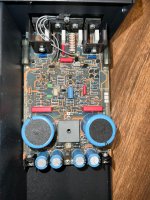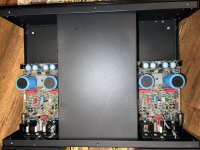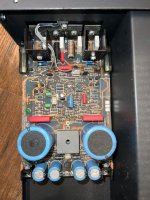I have a Counterpoint solid state power amplifier which I have been using since a year with my B&W 805 matrix speakers. This morning I changed my preamp to a Schiit Valhalla 2 Tube preamp and everything played well as usual. When I turned on my system this evening, both speakers were whining like a burglar alarm and I immediately switched off the power amp to be safe. There was a burning smell from the power amp for sure like some thing went wrong and the power amp has a 6 Amp 3Ag fuse for each channel next to the banana terminals. Upon observing, one fuse of the left channel had blown. I am reluctant to switch on the power amp again as I'm afraid if the speakers may get damaged.
Please advise what I can do to fix this and also is it possible for something from the Tube preamp pass through the attached rca interconnects and has caused this?
Thank you
Please advise what I can do to fix this and also is it possible for something from the Tube preamp pass through the attached rca interconnects and has caused this?
Thank you
Attachments
Do NOT turn this amp on again until it is totally repaired. You are lucky that you got a warning shot first.
Looking at the amount of damage, I'd say it might be best to take it to a professional repair shop or try to source a replacement module.Please advise what I can do to fix this..
Please advise what I can do to fix this and also is it possible for something from the Tube preamp pass through the attached rca interconnects and has caused this?
Tube pre-amps may output large DC voltages during power on or off. That may have damaged the inputs of the solid-state power amplifier.
Ed
No. It was playing well till I switched it off this noon. Then when I switched it back on this evening, the whining started from the speakers quite loud and the power amp started to give a burning smell. I switched off the power switch immediately and waited for 2 mins and switched it back on to see if it has stopped but it was still whining and the smell got more. I switched it off and unplugged it to check and saw the above.I see a resistor that's had a really bad day:
View attachment 1336370
Did the outputs get shorted while changing source?
That's interesting - how would they do that?Tube pre-amps may output large DC voltages during power on or off.
Noted. I thought it was a design on that ribbon like cloth because it looks exactly the same on both sidesI see burn marks on these components next to the power mosfets.
View attachment 1336365
Sorry I did not mention the model. It's a counterpoint 1E. Attaching picturesI suggest you find and post a service manual. You neglected to even identify the model.
My God. I hope the speakers are not damaged as wellTube pre-amps may output large DC voltages during power on or off. That may have damaged the inputs of the solid-state power amplifier.
Ed
How big capacitance would that be?The pre-amp's output coupling capacitors need to charge and discharge.
Anyhow, this aspect would be irrelevant if the preamp is switched on before the power amp.
At this point, the power amplifier needs professional servicing.
madis64 - The power amp's input may be damaged even if it is not turned on.
Ed
madis64 - The power amp's input may be damaged even if it is not turned on.
Ed
I switched on the preamp few seconds before the power amp was switched onHow big capacitance would that be?
Anyhow, this aspect would be irrelevant if the preamp is switched on before the power amp.
And in what sequenced did you switch the gear off "at noon" (when it was still operational)?I switched on the preamp few seconds before the power amp was switched on
The semiconductors connected directly with the damaged resistors are very likely damaged. With the help of a multimeter in diode mode and resistance mode you can determine which semiconductors are damaged. Damage very often manifests itself as a short.
Since the amplifier is damaged I suggest you use a series filament bulb. The purpose is to have a low series resistance in the case there is no damage and a high series resistance if the amplifier is faulty. Look up series bulb amplifier test.
Since the amplifier is damaged I suggest you use a series filament bulb. The purpose is to have a low series resistance in the case there is no damage and a high series resistance if the amplifier is faulty. Look up series bulb amplifier test.
I have a question. If the problem were to be identified and required soldering, would you be able to do this? Do you have knowledge of circuitry and experience? This is not 'replace the fuse and all is well'. Something bad happened and it will be an involved measure to find the problem.
Just as important will be to find a qualified repair shop!
Just as important will be to find a qualified repair shop!
- Home
- Amplifiers
- Solid State
- Power Amp burning smell


